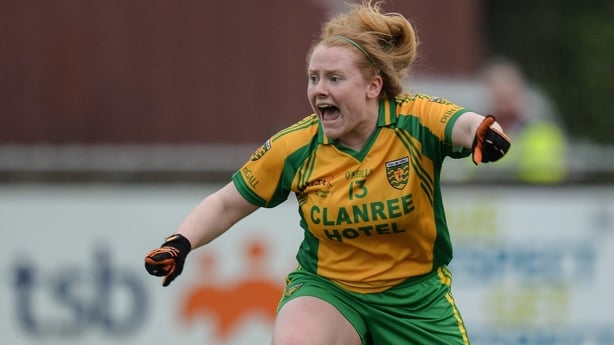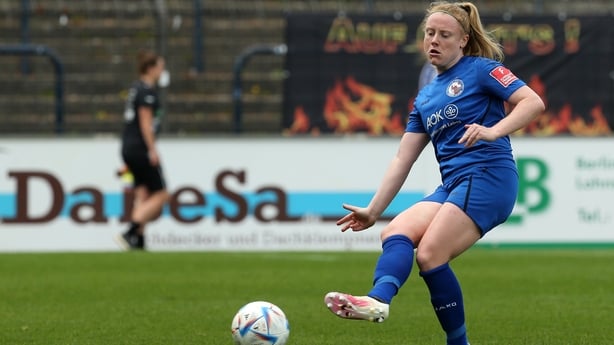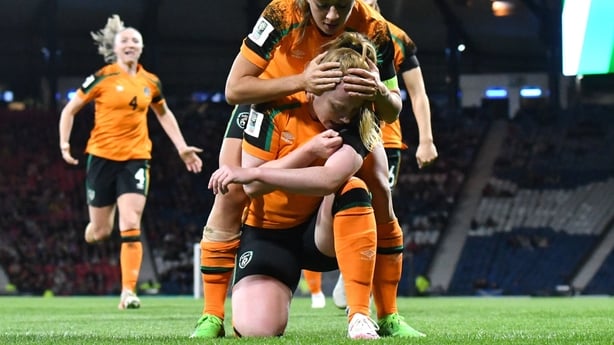Amber Barrett weaves her way through the lobby of the Castleknock Hotel and settles into a chair.
She's wearing a crisp, emerald green Republic of Ireland tracksuit and clutching two bottles of still water in her left hand; relaxed, but wide-eyed and focused.
It’s been quite a week.
The FIFA Women’s World Cup begins in 16 days and Barrett will be there, having rubberstamped her place in Vera Pauw’s 23-player squad with an all-action performance off the bench against Zambia, her two goals and overall influence eliminating any doubts she’d make it.
Not that it was ever really up for debate.
Barrett is an important figure in the camp; a strong character whose precise toepoke in the play-off against Scotland snaffled Ireland a golden ticket to Australia.
Over the next 45 minutes the 27-year-old will reflect on some of the signposts that have steered her in the right direction up to now: Maynooth, Finglas, Cologne, Glasgow and Creeslough.
But first, there is Milford, her hometown in Co Donegal.
The middle child in a family of five, Amber Barrett grew up in constant competition with her two brothers - Luke, three years older, and Kane, two years younger. Gaelic football was the staple diet.
Dad Shaun Paul - a garda sergeant - managed several senior club teams throughout her childhood [in more recent years he's led the county's minors and Under-20s], so the game was omnipresent. And you always had to win.
"The fact we grew up playing sport all the time, it made me, and us, really, really competitive," Barrett says.
"At the end of the day, I wanted to beat my brothers and they wanted to make sure I never won anything.
"When you are that young and you are doing it, you don’t take any notice of it, but in later life you realise that is where your competitiveness comes from. I’m very, very lucky in that regard."

That competition instilled a tough independent streak that would serve her well as life got a little more complicated.
Barrett came to a crossroads by the time she hit her teens. She was a super Gaelic footballer - for club and county - but other sports were consuming her time, namely athletics and soccer.
The former fell by the wayside when she left Milford to accept a soccer scholarship at Maynooth University - a significant rite of passage as the nest was fled for the first time.
"Donegal is quite an isolated place to live," she says. "We don't have the access to bus facilities, train facilities that you would have in Dublin… to be honest, I was really excited to move down.
"It did take me a few weeks to get used to being away as I am quite family-oriented, but I also love my own company. I often stayed down at weekends, partly down to the journey. It could take five hours to get from Maynooth to Donegal.
"I was raised not to be dependant on other people. My mum and dad are extremely supportive and still give me anything I ask for, but I also like to fend for myself.
"I am absolutely great on my own, I don’t need anybody to make me happy. I think the best thing I have ever done is be away from home."
And so the wheels were in motion for a career in the beautiful game. Barrett still managed to get home to play Gaelic football for Milford, but after she was picked up by Peamount United, and then spotted by Republic of Ireland boss Colin Bell, it became obvious that the dual commitments weren't compatible.
A bout of glandular fever that sidelined her for five weeks compounded the suspicion that a crazy schedule was taking its toll. Barrett went all in on soccer.
"Them boys hardened me up properly and gave me a very good outlook in life."
She also ploughed on with her teaching studies, completing three years at Maynooth before getting a Masters of Education at DCU.
As part of that process she went on a teaching placement to Beneavin College, an all-boys secondary school in Finglas, Dublin. As an environment, it was just about as far removed from Milford as you could get. And Barrett loved it.
"The experience was second to none because they were not afraid to tell me how they felt. What I liked about the boys was you could have war with one of them one day, and you’d see him after lunch and he would be all smiles.
"When you meet them head on, and are honest with them, they react really well to it. Them boys hardened me up properly and gave me a very good outlook in life.
"When I used to look after PE classes, they would ask me to join in. Some of them went in really, really hard. They wanted to prove themselves, 'I’m better than you'. There were days you’d want to absolutely kill them, but there were more good days than there were bad. It gave me a great insight."
It also helped to give her a thicker skin and a deeper hunger to try new things. In 2019, after four very successful years at Peamount, she signed for FC Koln in the Frauen-Bundesliga.
She describes it as one of her best decisions - a new experience, language and culture that rounded her as a player and a person. The team were relegated during her three-year spell there, but her memories of that time are positive.

However a move to another German outfit, Turbine Potsdam, in the summer of 2022, did not go well. Barrett was played out position, fell out of favour with the manager and became utterly disillusioned.
"My problem is, I'm very, very honest," she reflects. "I'd rather somebody just say, 'you're not what we need'. I found that every week it was a different answer.
"I think I'm quite a logical person. I was like, 'what you're saying to me can't be the reason I'm not playing'. Too many offsides. Not tactically good enough. Not listening to the coaches' instructions.
"I'm sitting there going, 'I just don't understand how these things can come back on me'. If Vera told me today she wanted me to do five burpees before the ball comes to me I would do it."
During a particularly bleak autumn, Ireland became a sanctuary. Barrett was included in Pauw's squad for the monumentally important World Cup play-off against Scotland at Hampden Park.
In the second half of a tense encounter, she came off the bench to score the winning goal.
A few days before that game, ten people, including a young child and two teenagers, died following an explosion at a petrol station in Creeslough, Co Donegal. Creeslough is the village where Barrett's grandparents were born; she had spent childhood summers and Christmases there.
The Ireland players wore armbands in mournful solidarity. After her goal, Barrett took a knee and pressed her cheek against the black fabric on her left bicep in a powerful, perfect tribute.
"It wasn't that Vera was like, 'oh this happened in Creeslough, I have to play Amber'," she says when reflecting on how the moment came to pass.
"I don't think it was the plan. I think she just felt there was something I could give. Ten minutes later, she was bang on.
"I was home a few days ago and me and my mum were talking about it again. My mum just said, 'Amber, there was something in the universe that night, the way it lined up'. It was meant to be. Things just didn't add up. Me playing didn't add up. Whatever is up there, that higher power, it works in your favour sometimes and you can't explain it, you know?"

In the dressing room after that famous win, Ireland players sang Celtic Symphony by the Wolfe Tones, a song which includes the line, 'Ooh, ah, up the Ra'. Footage of the celebrations went viral.
The following morning, the squad returned to Dublin for what was supposed to be a triumphant media event.
Instead it was dominated by questions about the dressing-room celebrations, with Sky Sports' Rob Wotton asking Chloe Mustaki, "Does it highlight the need for education on issues like this? Is that something you'd be for?"
The story raged hysterically for days, clouding the glory of their big breakthrough.
Barrett, who taught English and History, did not take umbrage with Wotton's line of questioning, or with the reaction generally.
"To be honest I didn't see the interview with Sky. I still haven't watched it," she says.
"At the end of the day, he is doing his job. He has to ask the questions. It happened, it was something we took responsibility for, there was no hiding from it.
"Creeslough was still the only thing in my mind. I received a message two days after the game from Hugh Harper, whose 14-year-old daughter died in the explosion. When I'm reading that I'm not thinking about anything bar what they've just gone through."
"I can't say that I've played my last game of Gaelic football."
Nine months have passed and Barrett is now preparing for the World Cup.
She has not been prolific for club or country over the last year but does possess a useful knack of delivering on the big occasions. Perhaps in a month's time there'll be a new Amber Barrett moment etched into the annals of Irish football history.
Having moved on from Turbine Potsdam to Standard Liege in Belgium, she has more barriers to break, more stages to conquer.
And then, she'd like to bring it all back home.
"I can't say that I've played my last game of Gaelic football," she smiles.
"I probably wouldn't be as good as I used to be... maybe with a wee bit of practice I could sharpen up again."
We need your consent to load this rte-player contentWe use rte-player to manage extra content that can set cookies on your device and collect data about your activity. Please review their details and accept them to load the content.Manage Preferences
Listen to the RTÉ Soccer podcast on Apple Podcasts, Spotify or wherever you get your podcasts.








